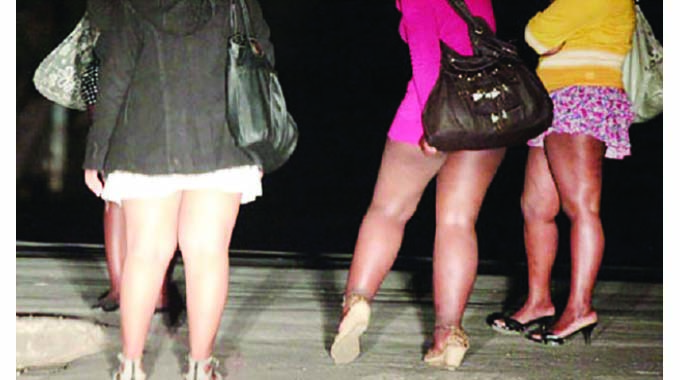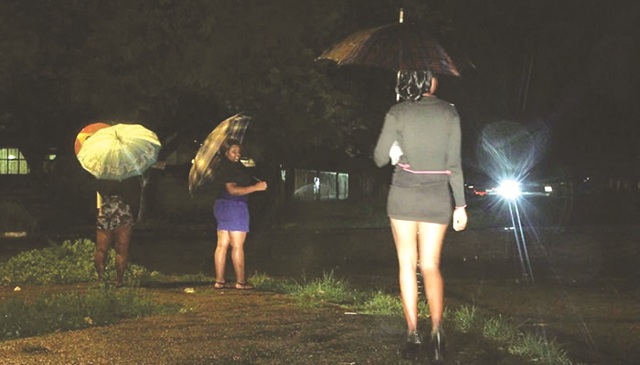Society’s attitude towards sex workers unjustified

Mbuso Ndhlovu, [email protected]
What caught my eye was her humility as we walked towards each other. The diastema and dimples as she fixed her gaze on me, probably trying to figure out if I could afford her, coupled with the butterflies in my belly, made me lose my step, almost twisting an ankle.
Sex workers have turned an intersection just a block from our offices into their hunting ground as it is close to several nightclubs. Usually the girls, conspicuous in their skimpy dressing all look alike, but this one appeared strangely different. Decently dressed in a skirt and long sleeves, even the language was out of place, PR stuff that shop merchandisers no longer use.
“Good evening, how can I help you?” she said. I thought she needed help, not me. I immediately decided against my short walk to the pubs on George Silundika Street but to engage the girl in conversation. Making myself clear that all she could help me with was her time, not services. I offered to pay what I considered generous, equal to a short time tryst.
*Lerato did not belong to the streets, I reckoned. She was too polished, polite; so why was she there? Could she tell me her story?
A first born in a family of six (5 boys) she had to fend for her siblings from a very young age. She is still sending the last born to school (high school) as the others are now in South Africa doing odd jobs but they assist whenever they can.
“I don’t like this job but I’m not qualified for anything else since I never finished secondary school. I’m proud of myself in that I have managed to raise my siblings and they always ask me to retire and pledge to assist me but I know it’s unrealistic. They have to live their lives and I’m glad they don’t have to go through what I experienced when our parents died.”
She even managed to save her Pumula East family house from greedy relatives who then disowned them, forcing her to turn to the streets.
Society’s attitude towards women on the streets needs to change. After engaging the woman in the nocturnal entertainment industry, it soon becomes clear that a lot still needs to be done although overtures have been made by various organisations to improve their lot. What is confusing is that the job is treated differently in different countries. In some countries like Sweden, sex workers are not illegal but it is illegal to pay them. In Germany they actually pay tax, whereas in France paying for sex is illegal but sex workers pay tax as other informal workers.
Nevada is the only American state that permits sex work. South Africa is working on decriminalizing sex work. In Zimbabwe, it is illegal for both men and women to solicit for the purpose of prostitution, but that is virtually impossible to prove hence the false notion that it is legal.
Demonising sex work endangers the whole community as medical attention is denied to sex workers. Doctors and nurses may shun ill sex workers or deny them education on diseases which exposes all members of the community as sex workers serve a huge market that also indirectly touches many people unknowingly.
We must remember that some teachers, doctors, priests, politicians and all respected professionals seek the services of those girls.
The first thing to do would be to recognise that these women are at work, legally or otherwise, and like any other worker they have rights that must be respected. We cannot wish them away no matter how much we loathe them. After all, it is men who run after them.
Of concern to Lerato is the high prevalence of violence at work. Rape, assault and even murder come with the territory. Raping or not paying a sex worker is not a serious crime according to many people as it is dubbed shoplifting. It was really pleasant in a way to read in H-Metro that police in Harare arrested two men for raping a sex worker recently. In Bulawayo a man was arrested for raping two prostitutes, B-Metro reported early this year. That shows that violence against sex workers should not be dismissed or reduced to a butt of jokes like calling it shoplifting.
Lerato believes some people think sex workers deserve everything that happens to them. After all, the sex industry is supposed to be violent and exploitative, so the girls are willingly putting themselves in danger.

prostitutes
The girls are generally in “survival mode” and know that they are mostly on their own. Some police officers take them seriously and listen to them, while others simply dismiss them outright. The girls share information and look out for each other mostly through their own intuition as they are vulnerable and unsafe.
“Consent, I think, means the right to say yes or no depending on the circumstances. I can ignore a motorist and prefer a pedestrian, as I’ve done with you. But nobody takes us seriously when we talk of lack of consent, police, media, courts, the public. After all our work is inherently violent. Rape, robbery, assault, abuse is to be expected.”
Sex workers do not deserve to be violently abused and tortured. That is an unfair labour practice and for them not to report such cases, they will be complicit in their own victimisation. They need to be empowered to stand up for their rights and it is not an easy road in light of stigmatisation.
In the United Kingdom, 69 percent of sex workers do not report harm against them to the police because they fear stigmatisation, they feel alienated by both police and the courts. Shockingly, 77 percent do not report sexual violence due to fear of being labelled criminals themselves.
Even in countries where sex work is legal, the women face discrimination and rejection. Most of them feel the need to hide their work from family and neighbours. It therefore becomes difficult to develop one’s career as logically, a successful career must have a buy-in and support from friends and community. In fact, the local community must provide the strongest base or platform for any business to thrive.
While it is obviously difficult for neighbours to seek sexual services from girls they literaly saw growing up, all that the girls are asking for is that they are taken seriously when they report violence and that their voices are heard. Sexual violence has to be tackled instead of regarding victims as “too damaged” thus whatever happens to them is self-inflicted. Sex workers have power over their bodies, lives and working conditions and as other workers elsewhere, they need to be protected from arbitrary labour conditions as stipulated under the United Nations International Labour Organisation — whose Labour Acts we are reminded of on May 1 every year.

The ladies need the same validation when they are harmed as any of us out there and the power must be in their hands. Society’s attitude must change as we are the customers driving this exciting industry.
Having been touched by Lerato’s story and being the last born myself, I turned to my single nephew to rescue her. Attractive as it is, a zebra is best admired in the bush while a donkey is brought to some arcadia at home, he said, showing how much the fight against stigmatisation is going to be long and brutal given that my nephew is a wealthy educated realtor. One can only imagine the brutality that the women face from less educated and less enlightened men if some law officers do not treat them with dignity.
*Not her real name*












Comments